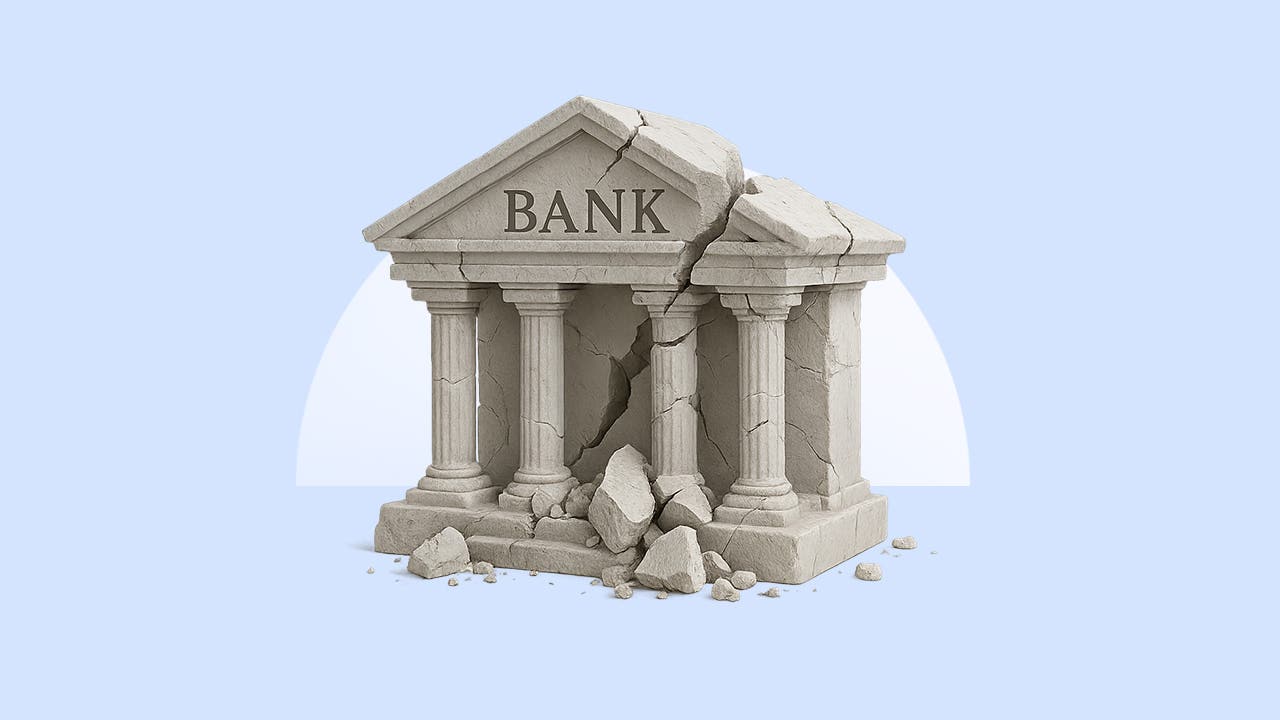What happens to a loan if a bank fails? Here’s what to know

Key takeaways
- If a bank closes, your loans will not be affected and your funds will be protected by the FDIC.
- If a lender collapses, your loan may be transferred to another institution, but you are still responsible for making payments.
- To protect yourself, make sure your contact information is up-to-date, keep copies of your statements, and continue making payments as usual.
- If your credit score decreases after the loan is transferred, contact your new lender to avoid potential issues.
If you have a personal loan or another type of loan and your lender goes under, there is some good news: You don’t have much to worry about. The assets are typically sold off, and you’ll be assigned to a new lender to manage the same loan. However, there are some precautions you should take to protect yourself, just in case.
If a bank collapses, what happens to its loans?
The first thing you need to know is that if you have a loan, it won’t be affected by the lender going bankrupt. Your repayment term, interest rate and outstanding balance should all remain the same. Most importantly, you must continue making payments, says Karen Bennett, senior banking reporter for Bankrate.
When a bank fails, the FDIC typically works to sell its assets — including its loans — to another bank or financial institution. Until that sale takes place, the FDIC will continue to service your loan. The bottom line is that, as a borrower, you’ll still need to make your loan payments as usual.— Karen Bennett, senior banking reporter for Bankrate
First, the lender’s assets are sold
When a bank closes, its assets are sold to settle its outstanding debts. Loans and other accounts are considered part of those assets. That means your loan account will most likely be sold to another institution, which will then take over and manage it just like your previous lender did.
In most cases, these accounts or assets are bundled and sold to a single institution. However, there’s also a chance that accounts are split among different companies. If you have more than one type of loan with the lender, you may end up with multiple creditors.
Next, you’ll hear from your new lender
Both the Federal Deposit Insurance Corporation (FDIC) and the new lender must send you a written notice with the transaction’s details. Once the transfer is completed, typically a month before payments begin, you’ll likely get another letter from your new lender. It will contain all your new account details, including your new due date and how to make payments.
Are debts forgiven if the lender goes bankrupt?
Although debts are a liability for you, they’re assets for the lender. When a lender files for bankruptcy, it must sell its assets to gain liquidity. So, no, your loans aren’t forgiven if your lender goes bankrupt. You’re still responsible for making payments. The only difference is that you’ll send payments to another institution instead of the one that originally gave you the loan.
While the failure of your lending institution shifts where your payments are sent, it doesn’t change the importance of paying off your loan. If you miss payments, it will result in personal loan default.
Your next steps if your lender goes under
Lenders may sell your loans and other accounts to other institutions at any time, even if they don’t go bankrupt. Though there isn’t anything you can do about it, you can take the following precautions to protect yourself in case something goes amiss during the account transfer:
- Make sure your contact information is up-to-date. Having the correct contact information on file will ensure you receive all important communications regarding your loan account and don’t miss any payments.
- Download and keep copies of your recent statements. Your loan terms, interest rate and outstanding loan balance should remain the same, even if you have a new lender. Still, having copies of your previous statements could be of help if some of this information gets mixed up during the transfer. These documents can also serve as evidence of your loan terms.
- Keep making payments as usual. Unless you’ve received your new account details from the new lender, you should keep making payments to your original lender, even if you’ve received notice that your account will be transferred soon. This will help you avoid missing a payment and keep you on track toward paying off your personal loan.
- Keep tabs on your credit score. You may see your credit score drop by a few points when your loan switches to a new servicer. However, this will be temporary until a payment history is established in that new account. If you see a drop in your credit score despite making payments as usual, that’s a sign that the lender may not have received the payment. If that happens, contact your new lender immediately, so they can help with this issue.
Are bank failures common?
Bank failures are not common, though they do happen. This is especially true when major events, like a recession or global pandemic, jolt the economy. While there have been 570 bank failures since 2001, according to the FDIC, the majority — 465 — were during the Great Recession (2007-2009) and the three years that followed (2010-2012). Since 2020, there have only been 13 bank failures, and only two in 2025 (as of July 29).
Bottom line
Learning that your lender has gone bankrupt can be a nerve-wracking experience. However, there’s not much to worry about. Your personal loan rates and terms should remain unchanged, even if the account is transferred to a different institution. Keep records of your payments and monitor your credit score closely in case of any discrepancies during the transition. If you keep making payments as usual and stay on the lookout for any communications that may come your way, you can avoid unpleasant surprises.
Why we ask for feedback Your feedback helps us improve our content and services. It takes less than a minute to complete.
Your responses are anonymous and will only be used for improving our website.






